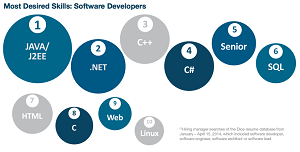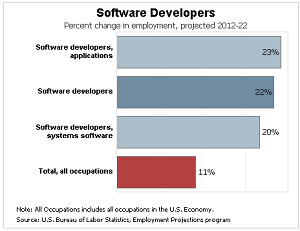In-Depth
The New Face of Developer Recruitment: Big Data & More
It's a new world for companies looking to find good software developers, and recruiters are turning to Big Data analytics and other tools to identify and land the best talent.
- By David Ramel
- June 12, 2014
Developers and engineers are sitting pretty, compared to not that long ago, with one of the most coveted jobs in the country and -- according to some reports -- newfound respect and influence. Yet organizations are still looking for the best talent, and they're using new ways to gauge a candidate's qualifications and find the best fit for their openings. It's no longer just a process of sifting through resumes, scheduling phone or video pre-screenings and then inviting candidates in for a series of interviews.
For example, many recruiters and hiring managers have been forced into taking a more pro-active and targeted approach to find the best potential hires. And some vacancies require an exact fit, demanding niche skills, eclectic experience or certain personality traits.
To meet such criteria, developers and software engineers are increasingly being judged on factors like participation in open source projects, engagement in coding-oriented social media sites like Stack Overflow, Quora and Slashdot, and the quality of the code they've written.
 [Click on image for larger view.]
The most-wanted developer skills
[Click on image for larger view.]
The most-wanted developer skills
(source: Dice.com)
Last year, I wrote about a company called Gild Inc. that's seeking to change the way employers are finding and evaluating technical talent. The company uses various ways to gather more information to paint a total picture of a candidate. "There has been an explosion in alternative ways to find candidates," said Gild co-founder and CEO Sheeroy Desai. Traditional methods are failing to surface the best software engineers -- the fact is software engineers have learned how to hide from recruiters! So we are seeing a lot of start-ups popping up with new and different ways to solve the problem."
The Role of Big Data
You can't hide from Big Data analytics, of course, so it has taken a primary role in the new-age talent search by Gild and others.
It's fine to single out one or a few developers and research their involvement in answering coding questions and contributing to open source projects, but that process is tedious and time-consuming. Automating this research earlier in the recruiting process is invaluable, and this has given rise to a whole new field: talent analytics. Joining Gild in this effort are companies like eQuest, TalentBin, Entelo, Dice (Open Web tool) and the appropriately named Talent Analytics.
 [Click on image for larger view.]
The development future is bright
[Click on image for larger view.]
The development future is bright
(source: U.S. Department of Labor)
"There are more opportunities today for employers to research candidates and to do it quickly through products that aggregate information together," said Shravan Goli, president of technical careers site Dice.com.
The Dice Open Web is one such tool, introduced last December. "What Open Web does is aggregate publicly available information on technology candidates and organizes it in a way that's effective for recruiters," Goli said. "In one search, recruiters can get information from up to 50 different social and professional sites. We take in the data, use our algorithms to match the data with the appropriate professional and offer a quick and easy way to connect with that professional through e-mail or their respective social footprint. We have signals based on their usage of Dice -- whether they are likely to be open to hearing about job opportunities or not. Essentially, Open Web has mapped the technology population, including engineers, in the U.S. for Dice."
David Bernstein, vice president of eQuest's Big Data division, penned an article for The Undercover Recruiter in which he outlined several ways Big Data is affecting the search for tech pros. "By leveraging Big Data, recruiters can transform their image from 'reactive,' responding to the 'just-in-time' talent needs of the business, to a 'proactive' business partner that has the foresight to make better and faster talent acquisition-related decisions," Bernstein wrote in an article titled, "How Big Data Is Taking Recruiters from 'I Think' to 'I Know.'"
A big problem with using Big Data this way, however, might be finding analytics talent to help with the search -- word is that it's hard to find such people.
A Change in Perspective and a New Playbook
The great demand for coding talent that has completely changed the dynamics of hiring has forced innovation through other tecniques, also. "I believe the problem is that the traditional players (and many of the new start-ups) come at the problem from a customer's perspective-only (that is, the hiring company's perspective)," Desai said. "We have chosen to come at the problem from the developer's perspective. Developers (software engineers) are frustrated with what they consider spam -- recruiters just spraying mass e-mails in the hope something will stick. The software engineers know they are in demand and they want to be marketed to as individuals -- a custom approach."
And if that doesn't work, the big boys with nearly unlimited resources have a distinct advantage over smaller companies -- they can just cast a wider net and buy what they need in bulk. "Companies like Yahoo and Facebook are totally rewriting the playbook," Desai said. "They actively go out and hire entire companies -- usually 10 to 20 developers -- and bring them on as a team. This shows how desperate companies are today to find the most talented developers."
Not everyone has those resources, of course, so for many, it's a question of using more targeted ways to spot talent and identify the best candidates for their needs.
It's All About Quality
"The trend over the past couple years, especially for start-ups, has been to judge a candidate on the 'body' of their online persona," according to recruiter Scott Dunlop, who founded The Bivium Group in Belmont, Mass. "This includes personal blogs, postings on various forums and contributions to open-source projects. A real effort in any of the areas absolutely does raise the relative value of the candidate above similar peers. Someone who is frequently on Stack Overflow or Slashdot -- and their content/material is strong -- will many times jump to the front of a queue. It's all about quality."
I asked Shane Pike, president of EngineerJobs.com, if he had seen evidence of recruiters and hiring managers paying more attention to candidates' participation in developer-oriented social media sites when evaluating job candidates.
"The smart ones do," Pike said. "Just like with checking Facebook and other social media sites to background candidates, these sites can sometimes give terrific insight into who you're considering."
Goli agreed, explaining that this process has been streamlined through the availability of new Big Data tools. "There are still only 24 hours in the day, so recruiters and hiring managers want as much information as possible, as quickly as possible on candidates," Goli said. "Hiring managers know there will be competition for the best talent, so they have to use insights derived from a tech professional's passions and interests both to interest them in their open position, as well as evaluate their technical and cultural fit."
Coding Contributions Count
Along with developer social sites, assessing a candidate's contributions to open source projects is another new-age recruiting technique gaining more prominence.
Pike pointed to the great imbalance between the supply of talented developers and the demand. "The scarcity is so great that recruiters are having to constantly find new ways to find developers," he said. "There are recruiting firms that even specialize in finding individuals on GitHub, for example. That's all they do."
Cooper said he sees open source involvement as a valuable indicator of a developer's make-up. "I think open source contributions say a lot about an engineer," Cooper said. "As a recruiter, it tells me that that someone is passionate about what they do and plays an active role in the tech community. There are plenty of great engineers that aren't going to have open source contributions to point to, and that's fine. However, if someone is very active in the Linux community or is an Apache committer, for example, it surely will capture the attention of recruiters and hiring managers alike."
Dunlop agreed. "This is an area that I cannot stress enough, in terms of value. For the top software companies in the Boston area, one of the best hallmarks that I personally have seen as a useful gauge of elite candidates is participation in open source projects."
New Ways Aren't Totally Usurping Traditional Methods
Are all these new-age techniques becoming more important than traditional evaluation methods such as collecting resumes, conducting screening interviews and so on?
"I wouldn't say more important," Pike said. "They're frequently a key piece, but we haven't heard or read of them becoming the most important. The area of importance where they're increasing the fastest is in sourcing of candidates. Great developers are obviously in very short supply. Going to where they already are has been a successful strategy for many.
Jason Cooper, practice manager at JobspringPartners.com, a recruitment and placement agency, said he thinks recruiters, rather than hiring managers, are using developer social sites because there are so many more open positions than qualified candidates. That forces recruiters to constantly seek new ways to source and connect with potential candidates. "There is no doubt that these sites are becoming a more popular place for engineers to showcase their skills and knowledge of technology trends," said Cooper, who works out of the company's Silicon Valley practice.
Another good way to find people is through Meetup.com groups, said Collen Kilduff at recruiting firm Modis. She is active in several meetup groups in the Denver area, such as DenverJS, Denver Technical Professionals and Denver Titanium Users. "But LinkedIn and Dice are still king for sourcing people," she said. "I find that HR likes to run their ads for IT talent on Dice, Stack Overflow and, in some cases, Craigslist."
Kilduff echoed many others in maintaining that traditional means of finding talent still rule. "Resumes are still essential once contact has been made," she said. "We can't create a person in our internal database without one. But having their links to GitHub for coders and portfolio samples on the resume (for UI/UX people), is becoming the norm."
So, while developers have the upper hand for now, it might not be time to put away your resume and just wait for the best offer to find you. Career and business trends tend to run in cycles, after all, and the industry could reverse direction and go back to the bad old days when programming was seen as a commodity service more cheaply met through off-shoring and foreign developers working under H-1B visas. And then there's that whole "teach everyone to code" thing.
As Cooper noted, "In 2009, companies could retain and recruit engineers because the majority of them were happy just to have jobs."
And that was just five years ago.